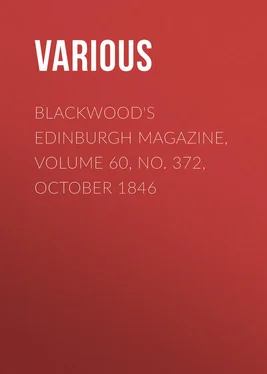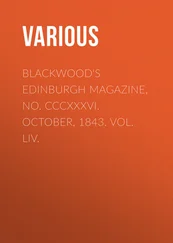Various - Blackwood's Edinburgh Magazine, Volume 60, No. 372, October 1846
Здесь есть возможность читать онлайн «Various - Blackwood's Edinburgh Magazine, Volume 60, No. 372, October 1846» — ознакомительный отрывок электронной книги совершенно бесплатно, а после прочтения отрывка купить полную версию. В некоторых случаях можно слушать аудио, скачать через торрент в формате fb2 и присутствует краткое содержание. Издательство: Иностранный паблик, Жанр: periodic, foreign_edu, Путешествия и география, на английском языке. Описание произведения, (предисловие) а так же отзывы посетителей доступны на портале библиотеки ЛибКат.
- Название:Blackwood's Edinburgh Magazine, Volume 60, No. 372, October 1846
- Автор:
- Издательство:Иностранный паблик
- Жанр:
- Год:неизвестен
- ISBN:нет данных
- Рейтинг книги:3 / 5. Голосов: 1
-
Избранное:Добавить в избранное
- Отзывы:
-
Ваша оценка:
- 60
- 1
- 2
- 3
- 4
- 5
Blackwood's Edinburgh Magazine, Volume 60, No. 372, October 1846: краткое содержание, описание и аннотация
Предлагаем к чтению аннотацию, описание, краткое содержание или предисловие (зависит от того, что написал сам автор книги «Blackwood's Edinburgh Magazine, Volume 60, No. 372, October 1846»). Если вы не нашли необходимую информацию о книге — напишите в комментариях, мы постараемся отыскать её.
Blackwood's Edinburgh Magazine, Volume 60, No. 372, October 1846 — читать онлайн ознакомительный отрывок
Ниже представлен текст книги, разбитый по страницам. Система сохранения места последней прочитанной страницы, позволяет с удобством читать онлайн бесплатно книгу «Blackwood's Edinburgh Magazine, Volume 60, No. 372, October 1846», без необходимости каждый раз заново искать на чём Вы остановились. Поставьте закладку, и сможете в любой момент перейти на страницу, на которой закончили чтение.
Интервал:
Закладка:
Various
Blackwood's Edinburgh Magazine, Volume 60, No. 372, October 1846
WILD SPORTS AND NATURAL HISTORY OF THE HIGHLANDS. 1 1 Wild Sports and Natural History of the Highlands. From the Journals of Charles St John, Esq. Murray. London: 1846.
This year we have been a defaulter on the Moors. Not that our eye has become more dim, our aim less sure, or our understanding weaker than of yore; but we are no longer subject to the same keen and burning impulses which used periodically to beset us towards the beginning of our departed Augusts, inflaming our destructive organs, and driving us to the heather, as the stag is said to be driven by instinct to the shores of the sea. Somehow or other, we now take things much more coolly. We no longer haunt the shop of Dickson – that most excellent and unassuming of gunmakers – for weeks before the shooting-season, discussing the comparative excellences of cartridge and plain shot, or refitting our battered apparatus with the last ingenuities of Sykes. Our talk is not of pointers or of setters; neither do we think it incumbent upon us to perambulate Princes Street in a shooting-jacket, or with the dissonance of hobnailed shoes. We can even look upon the northern steamers, surcharged with all manner of ammunition, crammed from stem to stern with Cockney tourists and sportsmen, carriages and cars, hampers, havresacks, and hair trunks, steering their way from our noble frith towards the Highlands, without the slightest wish to become one of that gay and gallant crew. Incredible as it may appear, we actually wrote an article upon the twelfth of August last; nor was the calm, even tenor of our thoughts for a moment interrupted by the imaginary whirr of the gor-cock. For the life of us, we cannot recollect what sort of a day it was. To be sure, we were early up and at work – that is, as early as we ever are, somewhere about ten: we wrote on steadily until dinner-time, with no more intermission than was necessary for the discussion of a couple of glasses of Madeira. After a slight and salubrious meal, we again tackled to the foolscap, and by nine o'clock dismissed the printer's devil to his den with a quarter of a ream of manuscript. We then strolled up to our club, where, for the first time, we were reminded of the nature of the anniversary, by the savour of roasted grouse. So, with a kind of melancholy sigh for the impairment of our blunted energies, we sat down to supper, and leisurely explored the pungent pepper about the backbone of the bird of the mountain.
But empty streets, hot sun, and dust like that of the Sahara, are combined nuisances too formidable for the most tranquil or indolent nature. It is not good for any one to be the last man left in town. You become an object of suspicion to the porters – that is, the more superannuated portion of them, for the rest are all gone to carry bags upon the moors – who, seeing you continue from day to day sidling along the deserted streets, begin to entertain strange doubts as to the real probity of your character, or, at all events, as to your absolute sanity. If you are a lawyer, and remain in town throughout August and September, your own conscience will tell you at once that you are nothing short of an arrant sneak. Are there not ten other months in the year throughout which you may cobble condescendences, without emulating the endurance of Chibert, and confining yourself in an oven, to the manifest endangerment of your liver, for the few paltry guineas which may occasionally come tumbling in? Will any agent of sense consider you a better counsel, or a more estimable plodder, because you affect an exaggerated passion for Morrison's Decisions , and refuse to be divorced even for a week from your dalliance with Shaw and Dunlop? Is that unfortunate Lord Ordinary on the Bills to be harassed day and night, deprived of his morning drive, and deranged in his digestive organs, on account of your unhallowed lust for fees? Is your unhappy clerk, whose wife and children have long since been dismissed to cheap bathing-quarters on the coast of Fife, where at this moment they are bobbing up and down among the tangled rocks, skirling as the waves come in, or hunting for diminutive crabs and cavies in the sea-worn pools – is that most oppressed and martyred of all mankind to be kept, by your relentless fiat, or rather wicked obstinacy, from participating in the same sanatory amusements with Bill, and Harry, and Phemie, and the rest of his curly-headed weans? Think you that the complaints of Mrs Screever will not be heard and registered against you in heaven, as, mateless and disconsolate, she cheapens haddocks in the market, or plucks sea-pinks along the cliffs of hoary Anstruther or of Crail? Shame upon you! Recollect, for the sake of others, if not for your own, that you call yourself a gentleman and a Christian. Shut up your house from top to bottom – fee the policeman to watch it – wafer a ticket on the window, directing all parcels to be sent to the grocer with whom you have deposited the key – give poor Girzy a holiday to visit her friends at Carnwath – and be off yourself, as fast as you can, wherever your impulses may lead you, either to the Highlands with rod and gun, or, if you are no sportsman, to Largs, or Ardrossan, or Dunoon, pleasant places all, where you may saunter along the shore undisturbed from morn until dewy eve, hire a boat at a shilling the hour, and purvey your own whitings; or haply, if you are in good luck, take a prominent part in the proceedings of a regatta, and make nautical speeches after dinner to the intense amusement of your audience.
But you say you are a physician. Well, then, cannot you leave your patients to die in peace? It is six months since you were called in to attend that old lady, who has a large jointure and a predisposition to jaundice. You have visited her regularly once a day – sometimes twice – prescribed for her a whole pharmacopeia of drugs – blistered her, bled her, leeched her – curtailed her of wholesome diet, forbidden cordial waters, and denounced the needful cinnamon. Dare you lay your hand on your heart and say that you think her better? Not you. Why not, then, give the poor old woman, who is not only harmless, but an excellent subscriber to several Tract societies, one chance more of a slightly protracted existence? Restore to her her natural food and adventitious comforts. Send her away to Cheltenham or Harrowgate, or some such other vale of Avoca, where, at all events, she may get fresh air, clean lodgings, and lots of mineral water. So shall you escape the pangs of an awakened conscience, and your deathbed be haunted by the thoughts of at least one homicide the less.
What we say to one we say to all. Stockbroker! you are a good fellow in the main, and you never meant to ruin your clients. It was not your fault that they went so largely into Glenmutchkins, and made such unfortunate attempts to bear the Biggleswade Junction. But why should you continue to tempt the poor devils at this flat season of the year, and with a glutted market, into any further purchases of scrip? You know very well, that until November, at the earliest, there is not the most distant prospect of a rise, and you have already pocketed, believe us, a remarkably handsome commission. Do not be in too great a hurry to kill the goose with the golden eggs. A rest for a month or so will make them all the keener for speculation afterwards, and nurse their appetite for premiums. We foresee a stirring winter, if you will but take things quietly in the interim. Assemble your brethren together – shut up the Exchange by common consent during the dog-days – convert your lists into wadding, and let Mammon have a momentary respite. – Writer to the Signet! is it fair to be penning letters, each of which costs your employer three and fourpence, when they are certain to remain unanswered? Do not do it. This is capital time for taking infeftments, and those instruments of sasine may well suffice to plump out the interior of a game-bag. No better witnesses in the world than a shepherd and an illicit distiller; and sweet will be your crowning caulker as you take instruments of earth and stone, peat and divot, and the like, in the hands of Angus and Donald, by the side of the spring, far up in the solitary mountain. Therefore, again we say, be off as speedily as you can to the moors, and leave the Deserted City to sun and dust, and the vigilance of a perspiring Town Council.
Читать дальшеИнтервал:
Закладка:
Похожие книги на «Blackwood's Edinburgh Magazine, Volume 60, No. 372, October 1846»
Представляем Вашему вниманию похожие книги на «Blackwood's Edinburgh Magazine, Volume 60, No. 372, October 1846» списком для выбора. Мы отобрали схожую по названию и смыслу литературу в надежде предоставить читателям больше вариантов отыскать новые, интересные, ещё непрочитанные произведения.
Обсуждение, отзывы о книге «Blackwood's Edinburgh Magazine, Volume 60, No. 372, October 1846» и просто собственные мнения читателей. Оставьте ваши комментарии, напишите, что Вы думаете о произведении, его смысле или главных героях. Укажите что конкретно понравилось, а что нет, и почему Вы так считаете.












